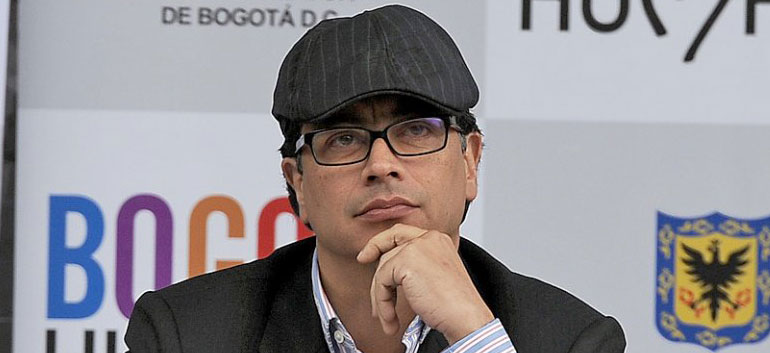Colombia’s State Council is expected to make a decision this week that will likely reinstate Gustavo Petro in his elected position as mayor of the nation’s capital city of Bogota, according to a national news magazine.
Now that Colombia’s Holy Week for Easter has concluded, former Mayor Petro is hoping for a political resurrection after being dismissed from his role by the country’s inspector general, State Council and president last month.
In December 2013, Inspector General Alejandro Ordoñez dismissed Petro from his mayorship and banned him from politics for 15 years after Petro tried to convert the city’s garbage collection contracts from private to public, which allegedly resulted in thousands of tons of trash left uncollected in the streets of Bogota.
Since his dismissal, Petro has appealed the decision many times, though all of his “tutelas” or writs of protection were denied by Colombia’s State Council.
Eyes to the State Council
The same high court that denied all Petro’s appeals on March 18 however, decided less than two weeks ago to consider the case of Petro one more time under the leadership of Magistrate Gerardo Arenas.
The decision that State Council Judge Arenas is expected to come out with before this week’s end will both see if there is a way to nullify the initial dismissal ordered by the inspector general, and determine if “precautionary measures” outlined initially by the Inter-American Commission on Human Rights should be extended to Petro’s case.
If granted, these precautionary measures “would simply be a guarantee that the mayor is not able to be thrown out of office while the process of [investigating his alleged wrong doing] is carried out,” according to Semana magazine.
Arenas stated that he would consider the opinions of the Inspector General’s Office.
MORE: Colombia’s latest Bogota mayor dismissal debates explained
Although Inspector General Alejandro Ordoñez and his team worked through last week drafting arguments explaining vehemently why such precautionary measures should not be considered for Petro, Semana believes that still, it is “not certain, but probable” that Petro will be reinstated as Bogota’s mayor with Arenas’ decision.
A tale of two Mayors
The logic comes from a late March decision by the State Council — less then 10 days after the high court denied all of Petro’s appeals — in which the council overturned a 2011 order by the inspector general to ban the former mayor of Medellin from serving political office for 12 years.
MORE: Medellin’s former mayor sees political rights restored
The court ruled that the sanctions against Medellin’s ex-Mayor Alonso Salazar were “disproportionate” to the alleged crimes (election tampering).
This, Semana argues, proved indicative of the direction the State Council might take and bodes well for Petro.
“The importance of this determination for Petro, was that it demonstrated to him that this high court is independent of Inspector General Alejandro Ordoñez, and that [the State Council] was ready to rectify that which they have considered excess actions of disciplinary sanctions,” read Semana’s editorial.
Less than 24 hours after the Salazar decision was announced, Petro’s lawyers had refocused their original appeals to mirror that of Medellin’s former mayor: their initial appeals that were struck down by the State Council discussed procedural issues of dismissing a democratically elected official; while their new appeal addressed the essence of the sanctions against Bogota’s former mayor.
This new appeal is what is being discussed right now by the State Council, under Judge Arenas.
It is important to note that when the high court initially rejected Petro’s appeals, it did so on the grounds that the “tutelas” that he filed were not the “route to impugn the inspector general’s decision,” rather than ruling on whether Ordoñez had overreached.
That being said, Arenas did not vote with the majority in that ruling, and in fact he was one of Petro’s biggest defenders during the court hearings.
Two potential routes to save Petro are now at the State Council’s feet, one which could shut down the sanctions due to excessive punishment on the part of the inspector general, the other which would reinstate the mayor in accordance with precautionary measures.
“Those [precautionary] measures are immediate and obligatory to comply with and they are ordered when there is an irreparable injury,” said lawyer Ivan Acuña to Colombia’s El Tiempo newspaper.
New Mayor doesn’t expect to stay long
Maria Mercedes Maldonado, the recently appointed Mayor of Bogota, said Monday that she does not expect to stay in office very long, hoping for Petro to be reinstated.
MORE: Bogota’s new mayor expects short stay in office
“We are awaiting court decisions in the Council of State which may favor [former] Mayor Petro, who could return. It is the best thing that could happen to Bogota,” the capital’s new mayor said.
President Juan Manuel Santos, who allowed the politician’s dismissal after the State Council’s initial decision, has said that if a court orders him to reinstate Petro, he would gladly do so.
MORE: Santos vows to reinstate dismissed Bogota Mayor if Colombian court orders to do so
Gustavo Petro has been transformed from a figure relatively unknown outside of Bogota into Colombia’s internationally recognized political martyr in just five months and the saga is set to continue.
MORE: From Mayor to Martyr: Gustavo Petro’s unexpected rise
The politician was once a member of the demobilized guerrilla group M-19.
Sources
- ¿Volverá Petro? (Semana)
- Las opciones de Gustavo Petro para volver a la Alcaldía (El Tiempo)
- La oposición de la Procuraduría a las medidas cautelares solicitadas por Petro (El Espectador)
- María Mercedes Maldonado, alcaldesa (e) de Bogotá (Semana)
- Petro aspira a volver a la alcaldía de Bogotá luego de nombramiento de Mercedes Maldonado (Pulzo)
- Procuraduría se opondrá a que Petro vuelva a la Alcaldía (Semana)


